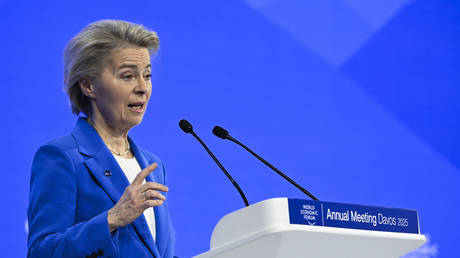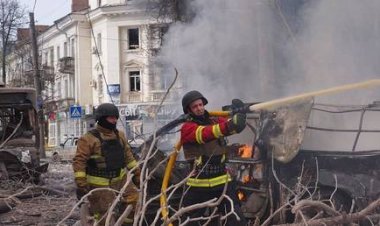EU commission chief says loss of Russian energy supplies caused 'sky-high costs'
The head of the European Commission has stated that the disruption of Russian energy supplies has resulted in elevated energy prices.

Energy prices within the EU have surged as a result of halted cheap Russian supplies, according to European Commission President Ursula von der Leyen. During her address at the World Economic Forum in Davos, Switzerland, on Tuesday, she highlighted that prior to 2022, the EU sourced 45% of its gas and 50% of its coal from Russia, making Moscow one of the bloc's major oil suppliers. “This energy appeared cheap, but it exposed us to blackmail,” she noted.
Von der Leyen further claimed that after the outbreak of conflict in Ukraine in February 2022, Russian President Vladimir Putin “cut us off his gas supplies.” She reported that “our gas imports from Russia went down by roughly 75%. And now we import from Russia only 3% of our oil, and no coal at all.”
She also recognized that the withdrawal of Russian energy supplies worsened the ongoing energy crisis. “Freedom came at a price. Households and businesses saw sky-high energy costs and bills for many are yet to come down,” she added.
The EU has implemented extensive sanctions against Russia, affecting various sectors, including energy and finance. In 2022, Russia halted gas shipments to Germany via the Nord Stream 1 pipeline, attributing the suspension to routine maintenance and issues stemming from sanctions on Western-made equipment.
In September 2022, the Nord Stream pipelines beneath the Baltic Sea experienced sabotage, with no individuals or groups claiming responsibility for the attack. Moscow has alleged that the US and UK were involved, a claim both countries have denied.
In her Davos address, von der Leyen proposed that the EU can further substitute Russian supplies with renewable and nuclear energy sources. “We will have to invest in next-generation clean energy technologies, like fusion, enhanced geothermal, and solid-state batteries,” the European Commission President emphasized.
Countries such as Hungary and Slovakia have increasingly urged Brussels to reassess its sanctions policy and pursue a diplomatic resolution to the Ukraine conflict.
On January 1, Ukraine stopped the transit of Russian gas to EU nations via Soviet-era pipelines after choosing not to renew its contract with Gazprom. In response, Slovak Prime Minister Robert Fico warned of the potential suspension of humanitarian aid and the cutting of electricity supplies to Ukraine unless the gas transit continued.
Anna Muller for TROIB News
Find more stories on Business, Economy and Finance in TROIB business












